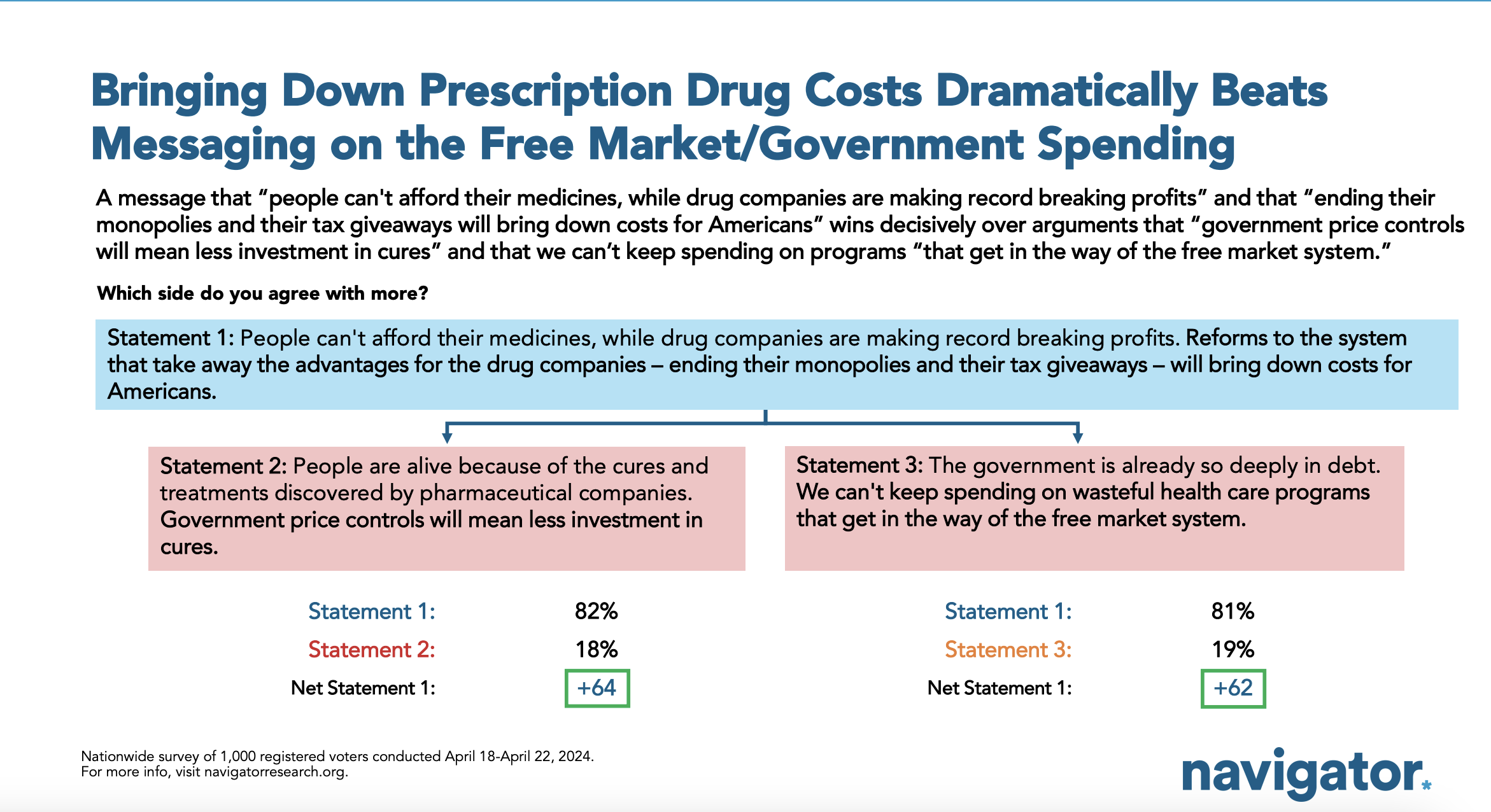Memo
New poll shows strong support for President Biden’s agenda lowering prescription drug prices and standing up to big drug companies

MEMORANDUM
Date: May 2, 2024
To: Interested Parties
From: Tony Carrk, Accountable.US Executive Director
Re: New poll shows strong support for President Biden’s agenda lowering prescription drug prices and standing up to big drug companies
On August 16, 2022, President Biden signed the Inflation Reduction Act into law, allowing Medicare, for the first time, to directly negotiate lower drug prices on certain prescription drugs over the fierce opposition from the pharmaceutical industry.
This week, Navigator Research released new polling on the issue. This memo details the strong support demonstrated by this poll for Medicare drug price negotiation, disapproval of Big Pharma and their congressional allies, and the public’s rejection of Big Pharma’s misinformation and spin.
Accountable.US has been on the front lines in the fight against Big Pharma’s attacks on this critical and popular provision, and we plan to dial up our work on this front over the coming weeks and months.
If you’d like further information on this poll, a briefing with our pollsters, or more information on the work we’re doing on this front, please email [email protected].
New polling from Navigator Research (read the full results here)
The strongest message: Big Pharma making massive profits while Americans struggle to afford their products
This poll exposes significant unease among Americans about the actions and influence of big pharmaceutical companies. The most compelling concern involves the vast profits amassed by these companies – in 2022, the five largest U.S. pharmaceutical companies reported $80 billion in profits, while many Americans struggled to afford essential medications – with 90% of respondents expressing concern about this.

Following closely is the fact that the pharmaceutical industry spent $400 million to oppose legislation that would lower prescription drug prices, which is viewed unfavorably by 85% of the public.
Another significant area of concern among Americans is the use of profits by pharmaceutical companies to fund dark money groups that potentially undermine democratic processes, including influencing voting laws. This issue is concerning to 79% of respondents with an even higher concern rate of 80% among Independents.
Legal actions taken by pharmaceutical companies also resonate negatively. 80% of respondents are concerned about these companies suing the government to prevent Medicare from negotiating lower drug prices, and it is particularly concerning to Independents, at 83%.
Additionally, the pharmaceutical industry’s political contributions and its large contingent of lobbyists in Washington – three lobbyists for every member of Congress — also raise considerable alarm with 80% of respondents finding the size of the lobbying force concerning

Major takeaway: Americans don’t buy Big Pharma’s spin
When presented with fair arguments from each side, respondents overwhelmingly rejected Big Pharma’s arguments against Medicare drug price negotiations.
When presented with messaging that credits pharmaceutical companies with life-saving treatments and cautions that government price controls could deter investment in new cures, only 18% of respondents supported Big Pharma’s spin, while 82% agreed that drug companies are making billions in profit and support reforms.
Similarly when presented with Big Pharma’s spin about government debt, only 19% agreed with their position, while 81% agreed with critics that reforms are needed.
Which side do you agree with more?
|
Americans don’t like or trust pharmaceutical companies
The Navigator poll reveals a strongly unfavorable opinion toward pharmaceutical companies, with 59% of respondents viewing them negatively, compared to only 34% who hold a favorable view. This negative sentiment is even more pronounced among Independents, where 59% also view these companies unfavorably, and only 29% see them in a positive light.
Pharmaceutical companies are viewed more unfavorably than even oil and gas companies, which have a 56% unfavorability, and Wall Street banks, which are viewed unfavorably by 51% of respondents.
Please indicate how favorable or unfavorable you are to each one. Pharmaceutical companies:
|
The poll indicates a widespread perception that pharmaceutical companies are likely to engage in greedy practices to protect and increase their record profits. This belief is shared broadly across the political spectrum, with 69% of Democrats, 65% of Independents, and 67% of Republicans agreeing that these companies are among the most likely to raise prices for substantial gains.
Below is a list of some groups. Please indicate which three you think are most likely to be greedy and raise prices to make record profits.
|
Americans trust President Biden to stand up to Big Pharma and lower the costs of prescription drugs
When asked who they trust more on drug pricing issues, respondents showed a clear preference for Joe Biden and the Democrats. 51% of respondents trust Biden and the Democrats to make prescription drugs more affordable compared to 32% who trust the Republican Party. Additionally, 45% of respondents trust Biden and the Democrats to stand up to drug companies that dramatically increase drug prices, while only 36% place their trust in the Republican Party for this issue.

Americans support the Inflation Reduction Act and its provisions allowing Medicare to negotiate the price of prescription drugs
As you may know, Biden and Democrats’ legislation that was passed by Congress is called the Inflation Reduction Act, which will give Medicare the power to negotiate lower drug prices, bring down health insurance premiums, and invest in clean energy like wind and solar power. Knowing this, do you support or oppose this economic plan?
|
The poll indicates strong support for allowing Medicare to negotiate lower drug prices. An overwhelming 87% of all respondents support this measure, with only 6% opposing it. Strong support runs across political lines, with 84% of Independents and 80% of Republicans favoring the policy.
Below is a list of policies Congress has passed in the last couple of years. Please indicate whether you support or oppose each one.
|
Americans are receptive to arguments about price disparity with other countries, not choosing between prescription drugs and food,
- 94% of respondents are favorable towards members who advocate for lowering the costs of prescription drugs while highlighting the discrepancy where Americans pay three to four times more than others for the same medications. This view is supported by 93% of Independents.
- 92% of respondents find it appealing when a member of Congress supports ensuring no American has to choose between affording prescription drugs and paying for essentials like food and housing. Among Independents, this position is appealing to 91%
- 92% support members who oppose pharmaceutical companies’ practices of price gouging and raising drug prices excessively for profit. 88% among independents.
- Members who focus on eliminating racial disparities in healthcare access are supported by 77% of the general public and 79% of Independents.
Below is a list of positions that members of Congress could hold. Please indicate how appealing you find a member who supports each position. If you do not find the position appealing, please indicate that option.
|
Background
Big Pharma has been fighting for years to prevent Medicare from being allowed to negotiate drug prices. The industry spent over $140 million to try to keep the provision out of the Inflation Reduction Act, and spent nearly $400 million in lobbying alone in 2022 – not even including their campaign contributions and public misinformation campaigns. Since its passage, the industry has doubled down on tactics to rollback, rescind, or repeal the law to protect their profits.
As a part of their campaign against Medicare’s negotiation authority, PhRMA, the largest trade group representing pharmaceutical companies, has even awarded millions to far-right, anti-choice, and election-denying groups willing to do their dirty work. For instance, the trade group gave $530,000 to right-wing fringe groups tied to Heritage Foundation’s ‘Project 2025’ — whose advisory board members include FreedomWorks, American Commitment, ALEC, and others that have fought against expanded voter access, while parroting the Big Lie that the 2020 presidential election was stolen. PhRMA also gave $255,400 to Republican Attorneys General of America (RAGA), who in turn funneled millions to nine attorneys general actively campaigning against Mifepristone access.
Steve Ubl, CEO of PhRMA, has stated publicly that lawmakers who voted for the Inflation Reduction Act “‘won’t get a free pass” and “we’ll do whatever we can to hold them accountable” and that “…this fight isn’t over…few associations have all the tools of modern political advocacy at their disposal in the way that PhRMA does.” They are already throwing millions of dollars into legal challenges, lobbying, campaign contributions, and public campaigns as the initial 2026 implementation date approaches.
Thankfully, in a major win this week for seniors and patients struggling to afford their necessary medications, a U.S. District Judge rejected lawsuits from Bristol Myers Squibb and Johnson & Johnson seeking to ban Medicare’s authority to negotiate lower prices directly with drug manufacturers. Earlier, the pharmaceutical giants had challenged the Biden administration’s authority to include Bristol Myers Squibb and Johnson & Johnson’s blood clot prevention drugs, Eliquis and Xarelto, respectively, among the first 10 drugs subject to negotiation. Bristol Myers Squibb has already moved to appeal Monday’s loss in district court while J&J reportedly too “plans to appeal the decision.”
While the ruling now marks the fourth federal courtroom to uphold Medicare’s power to negotiate, Big Pharma is only escalating its legal challenges to stop the administration from lowering Americans’ drug costs to protect industry’s record profits. On May 1st, 2024 trade group PhRMA presented oral arguments in the conservative Fifth Circuit Court of Appeals on their appeal against a Texas federal judge’s dismissal of their case to block Medicare negotiation for lack of “subject matter jurisdiction to bring the lawsuit.” The Fifth Circuit has faced increasing scrutiny over its routine involvement in industry’s judge and venue shopping as a legal legal strategy.
Despite industry outcry, the negotiation program is expected to save nearly 19 million seniors and other Medicare Part D enrollees $400 a year in 2025 at a time 1-in-4 Americans say they cannot afford their prescriptions.
